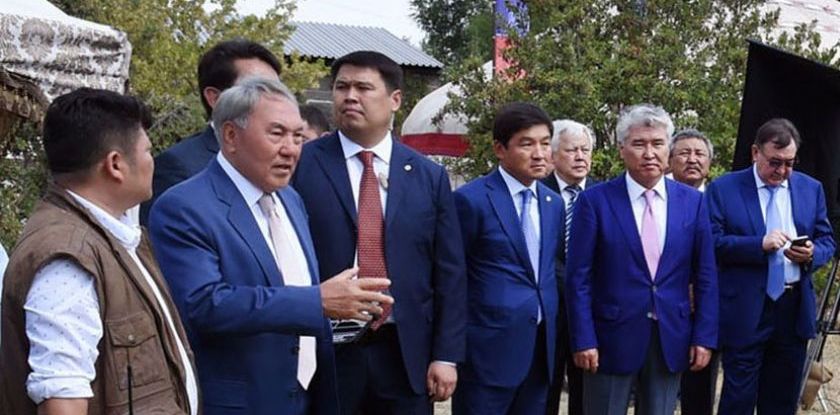Judging by Nursultan Nazarbayev’s program article of April 12, 2017 called “Glance into the Future: Modernizing the Public Consciousness”, the Kazakh president is very much dissatisfied with our people. There could be no other explanation. So, Akorda now must solve the task that is threefold and of a landmark nature – to carry out political reforms, to modernize the economy, and re-educate the Kazakhs making them the proponents of a new public consciousness.
We believe the current Kazakh authorities have hardly any chance to modernize the economy and carry out the announced political reforms. Thus, in this article, we will concentrate on the new task especially since they have established a whole new political institution to solve it, the National Commission for implementation of public consciousness modernization program.
Let us start with the classic (and, in our opinion, correct) Karl Marx’s quote, “It is not the consciousness of men that determines their existence, but, on the contrary, their social existence that determines their consciousness”. We doubt that Nazarbayev, though once a devoted communist who served as the Party First Secretary of Kazakhstan and at the Political Bureau of the CPSU, still remembers the basics of Marxism. And this is, actually, a bad thing, otherwise, he would not have burdened the state with the unsolvable problems.
To confirm our thesis on the unfeasibility of the task, we will cite the press-release of the State Revenue Committee of the Ministry of Finance of Kazakhstan. It was issued on March 14, 2017, and was written on the subject of the unpaid tax damages that amounted to 54 bln 568 mln 910 thousand 786 tenge. You can find its full text on the official cite of the agency. Here we will present the essential quotes from it.
“The investigative team of the State Revenue Committee had finished its pre-trial investigation of the criminal case against an organized criminal group accused of registering 84 commercial organizations for the purpose of exempting the partnering companies from taxes, deriving other commercial profit, concealing other banned activities that caused a considerable damage to the state, unlawful manufacturing and selling of other billing documents.
The organized criminal group employed the following scheme. They registered “dummy” companies to nominal bodies. Then, they transferred the money to these companies and cashed it out via checks. The cash, then, was delivered to the party that ordered the scheme minus the commission”.
“During the pre-trial investigation, it was established that the organized criminal group (that consisted of more than 20 people), through checking accounts opened in the commercial banks of Almaty, cashed out 159 bln 227 mln 496 thousand 716 tenge (the criminal group’s commercial profit amounted to 6% of the cashed-out money resources which equals 9 bln 553 mln 649 thousand 802 tenge).
The damage to the state budget amounts to 54 bln 568 mln 910 thousand 786 tenge.
Resulting from the investigative team’s work, the damages paid to the state budget from 2293 legal bodies amount to 5 107 407 171 tenge, the money resources arrested in the “dummy” companies’ deposit boxes amount to 240 982 675 tenge”.
Let us estimate the economy effect of the presented business-scheme by using the aforementioned numbers. We will round them off for convenience. In total, they cashed out 159 bln of the money resources received from 2293 legal bodies. Therefore, each of the 84 enterprises involved in the scheme had, on average, about 27 clients. Each of these clients cashed out 69 mln tenge.
At that, the final expenditures of the scheme participants amounted to the following – about 4 mln tenge paid for the “cash out company” services, about 2 mln tenge lost as a result of paying the damages to the state budget. Therefore, of the 69 mln tenge, each legal body/scheme participant lost only 6 mln.
Since one’s place at the market in Kazakhstan can be lost easily and one’s business image is hardly worth anything, it turns out that such a cash out scheme can be quite beneficial. This is what the existence in Kazakhstan is like today. And it cannot be changed by the law enforcement, judicial, or administrative methods even if they increase the number of law enforcement agents exponentially.
We will leave the question of changing the public consciousness of the Kazakh entrepreneurs open. We believe, to succeed in this undertaking, the authorities must cardinally change the economic situation, simplify and ease the rules of doing business, completely rework the state economic policy and many other issues in the country. Only then, the business will have the incentive to be transparent and pay all the taxes. Only then, and not a day earlier, can we expect the consciousness of hundreds of thousands of individual entrepreneurs to change.
It is not even worth mentioning that, in Kazakhstan, there is a great number of fields where existence predetermines and forms the wrong public consciousness. So, Nazarbayev’s article is not so much a program document that can and should be implemented but rather some fantasy on a topical subject, a reason to talk more about the greatness of the president and the wisdom of his ideas.
Nazarbayev’s assignments have no chance to be completed in practice since neither he nor his government has working instruments for implementing them. They probably will transcribe the Kazakh language into the Latin alphabet. But will it have any positive influence on the public consciousness? Will they steal less, not take bribes, abuse their authority, be idle, etc.? We are not so sure.




